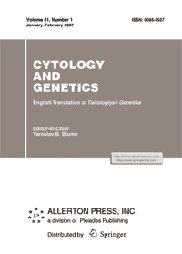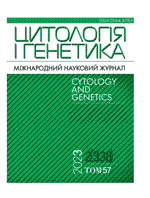Кіназа рибосомного білка S6 (S6K1) є одним із ключових компонентів PI3K/mTOR/S6K1-залежного сигнального каскаду, який відіграє важливу роль в регуляції трансляції, клітинного росту, виживання, проліферації та міграції клітини. Порушення в функціонуванні PI3K/mTOR/S6K1 сигнального каскаду зокрема зміни в експресії та активності S6K1 супроводжують розвиток цілої низки патологій людини серед яких онкологічні, нейродегенеративні та серцево-судинні захворювання, метаболічні розлади, а також патології, що пов’язані зі старінням. Нещодавно, в доповнення до вже відомих р70 та р85 підтверджено існування нової ізоформи кінази S6K1 – р60. Крім того, встановлено, що зміна балансу в експресії різних ізоформ S6K1 в бік збільшення р60-S6K1 призводить до багаторазового підвищення рухливості модельних злоякісних клітин, що супроводжується суттєвими змінами в експресії молекул залучених до клітинної адгезії та міжклітинної взаємодії і може свідчити про набуття клітинами пухлин ознак важливих для інвазії та метастазування. Для з’ясування питання чи експресія р60 ізоформи S6K1 корелює з інвазією та мета-стазуванням на рівні пухлини було проаналізовано рівень експресії ізоформ S6K1 в трьох групах пухлин папілярної карциноми щитоподібної залози людини, а саме: без ознак інвазії, з ознаками інвазії та з метастазами в лімфатичні вузли. Одночасно проаналізовано і прилеглі до пухлин умовно-нормальні тканини. Аналіз проводили методом ПЛР в реальному часі. Встановлено тенденцію до підвищення рівня експресії як усіх ізоформ S6K1, так і окремо р60-ізоформи S6K1 в пухлинах з проявами інвазії та метастазування. Однак статистично достовірними виявилися зміниспіввідношення сумарного рівня експресії всіх ізоформ S6K1 до p60-S6R 1 в бік збільшення частки останньої в пухлинах з проявами метастазування. Отримані результати вказують на важливу роль ізоформи р60S6K1 в підтримці чи ініціації інвазії та метастазування пухлин щитоподібної залози.
Ключові слова: S6K1, р60-S6K1, щитоподібна залоза, папілярна карцинома, метастази

Повний текст та додаткові матеріали
Цитована література
Amaral, C.L., Freitas, L.B., Tamura, R.E., Tavares, M.R., Pavan, I.C.B., Bajgelman, M.C., Simabuco, F.M., S6Ks isoforms contribute to viability, migration, docetaxel resistance and tumor formation of prostate cancer cells, BMC Cancer, 2016, vol. 16, p. 602. https://doi.org/10.1186/s12885-016-2629-y
Ben-Hur, V., Denichenko, P., Siegfried, Z., Maimon, A., Krainer, A., Davidson, B., et al., S6K1 alternative splicing modulates its oncogenic activity and regulates mTORC1, Cell Rep., 2013, vol. 3, no. 1, pp. 103–115. https://doi.org/10.1016/j.celrep.2012.11.020
Bepler, G. and Koehler, A., Multiple chromosomal aberrations and 11p allelotyping in lung cancer cell lines, Cancer Genet. Cytogenet., 1995, vol. 84, pp. 39–45. https://doi.org/10.1016/0165-4608(95)00063-1
Berven, L.A., Willard, F.S., and Crouch, M.F., Role of the p70S6K pathway in regulating the actin cytoskeleton and cell migration, Exp. Cell Res., 2004, vol. 296, pp. 183–195. https://doi.org/10.1016/j.yexcr.2003.12.032
Dann, S.G., Selvaraj, A., and Thomas, G., MTOR Complex1-S6K1 signaling: at the crossroads of obesity, diabetes and cancer, Trends Mol. Med., 2007, vol. 13, no. 6, pp. 252–259. https://doi.org/10.1016/j.molmed.2007.04.002
Fenton, T.R. and Gout, I.T., Functions and regulation of the 70kDa ribosomal S6 kinases, Int. J. Biochem. Cell Biol., 2011, vol. 43, no. 1, pp. 47–59. https://doi.org/10.1016/j.biocel.2010.09.018
Foster, K.G. and Fingar, D.C., Mammalian target of rapamycin (mTOR): conducting the cellular signaling symphony, J. Biol. Chem., 2010, vol. 285, no. 19, pp. 14071–14077. https://doi.org/10.1074/jbc.R109.094003
Hoeffer, C.A. and Klann, E., mTOR signaling: at the crossroads of plasticity, memory and disease, Trends Neurosci., 2010, vol. 33, no. 2, pp. 67–75. https://doi.org/10.1016/j.tins.2009.11.003
Hotsuliak, N.Ya., Kravchenko, A.O., Kosach, V.V., Tykhonkova, I.O., and Khoruzhenko, A.I., Sensitivity of MCF-7 cells with differential expression of S6K1 isoforms to the regulatory impact of fibroblasts, Biopolym. Cell, 2020, vol. 36, no. 3, pp. 210–228. https://doi.org/10.7124/bc.000A2E
Jafari, N., Zheng, O., Li, L., Li, W., Q, L., Xiao, J., Gao, T., and Huang, C., p70S6K1 (S6K1)-mediated phosphorylation regulates phosphatidylinositol 4-phosphate 5-kinase type i γ degradation and cell invasion, J. Biol. Chem., 2016, vol. 291, no. 49, pp. 25729–25741. https://doi.org/10.1074/jbc.M116.742742
Karni, R., de Stanchina, E., Lowe, S.W., Sinha, R., Mu, D., and Krainer, A.R., The gene encoding the splicing factor SF2/ASF is a proto-oncogene, Nat. Struct. Mol. Biol., 2007, vol. 14, no. 3, pp. 185–193. https://doi.org/10.1038/nsmb1209
Khotskaya, Y.B., Goverdhan, A., Shen, J., Ponz-Sarvise, M., Chang, S.-S., Hsu, M.C., et al., S6K1 promotes invasiveness of breast cancer cells in a model of metastasis of triple-negative breast cancer, Am. J. Transl. Res., 2014, vol. 6, no. 4, pp. 361–376. https://doi.org/10.1158/1557-3125.MODORG-A49
Kim, D., Akcakanat, A., Singh, G., Sharma, C., and Meric-Bernstam, F., Regulation and localization of ribosomal protein S6 kinase 1 isoforms, Growth Factors, 2009, vol. 27, no. 1, pp. 12–21. https://doi.org/10.1080/08977190802556986
Kinkade, C.W., Castillo-Martin, M., Puzio-Kuter, A., Yan, J., Foster, T.H., Gao, H., et al., Targeting AKT/mTOR and ERK MAPK signaling inhibits hormone-refractory prostate cancer in a preclinical mouse model, J. Clin. Invest., 2008, vol. 118, no. 9, pp. 3051–3064. https://doi.org/10.1016/j.urolonc.2008.12.004
Kosach, V.R., Hotsuliak, N.Ya., Zaiets, I.V., Skorokhod, O.M., Savinska, L.O., Khoruzhenko, A.I., and Filonenko, V.V., Alterations in expression of S6K1 isoforms in MCF7 cells have a strong impact on the locomotor activity as well as on S6K1 and Akt signaling, Biopolym. Cell, 2020, vol. 36, no. 2, pp. 110–121. https://doi.org/10.7124/bc.000A25
Kremer, C.L., Klein, R.R., Mendelson, J., Browne, W., Samadzedeh, L.K., Vanpatten, K., et al., Expression of mTOR signaling pathway markers in prostate cancer progression, Prostate, 2006, vol. 66, no. 11, pp. 1203–1212. https://doi.org/10.1002/PROS.20410
Li Chen, L., Chung, J., and Huang, S., Rapamycin inhibits F-actin reorganization and phosphorylation of focal adhesion proteins, Oncogene, 2008, vol. 27, pp. 4998–5010. https://doi.org/10.1038/onc.2008.137
Liu, L., Li, F., Cardelli, J.A., Martin, K.A., Blenis, J., and Huang, S., Rapamycin inhibits cell motility by suppression of mTOR-mediated S6K1 and 4E-BP1 pathways, Oncogene, 2006, vol. 25, pp. 7029–7040. https://doi.org/10.1038/sj.onc.1209691
Liu, L., Luo, Y., Chen, L., Shen, T., Xu, B., Chen, W., Zhou, H., Han, X., and Huang, S., Rapamycin inhibits cytoskeleton reorganization and cell motility by suppressing RhoA expression and activity, J. Biol. Chem., 2010, vol. 285, pp. 38362–38373. https://doi.org/10.1074/jbc.M110.141168
Lytvyn, D.I., Dudchenko, T.M., Lyzogubov, V.V., Usenko, V.S., Nespryadko, S.V., Vinnitskaya, A.B., Vorobyova, L.I., Pal’chevskiy, S.S., Filonenko, V.V., and Pogrebnoy, P.V., Expression of α- and β-isoforms of p70S6 kinase in human endometrial tumors, Exp. Oncol., 2003, vol. 25, no. 4, pp. 274–278.
Lyzogubov, V.V., Usenko, V.S., Khojaenko, Yu.S., Lytvyn, D.I., Soldatkina, M.A., Rodnin, N.V., Filonenko, V.V., and Pogribniy, P.V., Immunohistochemical analysis of p70S6 kinase α in human thyroid tissue upon pathology, Exp. Oncol., 2003, vol. 25, no. 4, pp. 304–306.
Lyzogubov, V.V., Lytvyn, D.I., Dudchenko, T.M., Lubchenko, N.V., Pogrybniy, P.V., Nespryadko, S.V., Vinnitska, A.B., Usenko, V.S., Gout, I.T., and Filonenko, V.V., Immunohistochemical analysis of S6K1 and S6K2 expression in endometrial adenocarcinomas, Exp. Oncol., 2004, vol. 26, no. 4, pp. 287–293.
Lyzogubov, V., Khozhaenko, Y., Usenko, V., Antonjuk, S., Ovcharenko, G., Tikhonkova, I., and Filonenko, V., Immunohistochemical analysis of Ki-67, PCNA and S6K1/2 expression in human breast cancer, Exp. Oncol., 2005, vol. 27, no. 2, pp. 141–144.
Mathieson, W., Betsou, F., Myshunina, T., Pushkarev, V., Pushkarev, V., Shinkarkina, À., et al., The effect of long-term −80°C storage of thyroid biospecimens on RNA quality and ensuring fitness for purpose, J. Clin. Pathol., 2016, vol. 69, no. 12, pp. 1105–1108. https://doi.org/10.1136/jclinpath-2016-203697
Menon, S. and Manning, B.D., Common corruption of the mTOR signaling network in human tumors, Oncogene, 2008, vol. 27, pp. S43–S51. https://doi.org/. 2009.352https://doi.org/10.1038/onc
Monni, O., Bärlund, M., Mousses, S., Kononen, J., Sauter, G., Heiskanen, M., et al., Comprehensive copy number and gene expression profiling of the 17q23 amplicon in human breast cancer, Proc. Natl. Acad. Sci. U. S. A., 2001, vol. 98, no. 10, pp. 5711–5716. https://doi.org/10.1073/pnas.091582298
Murugan, A.K., mTOR: Role in cancer, metastasis and drug resistance, Semin Cancer Biol., 2019, vol. 59, pp. 92–111. https://doi.org/10.1016/j.semcancer.2019.07.003
Pernot, S., Evrard, S., and Khatib, A.M., The give-and-take interaction between the tumor microenvironment and immune cells regulating tumor progression and repression, Front. Immunol., 2022, vol. 13, p. 850856. https://doi.org/10.3389/fimmu.2022.850856
Pópulo, H., Lopes, J.M., and Soares, P., The mTOR signalling pathway in human cancer, Int. J. Mol. Sci., 2012, vol. 13, no. 2, pp. 1886–1918. https://doi.org/10.3390/ijms13021886
Qiu, Z.X., Sun, R.F., Mo, X.M., and Li, W.M., The p70S6K specific inhibitor PF-4708671 Impedes non-small cell lung cancer growth, PLoS One, 2016, vol. 11, no. 1, p. e0147185. https://doi.org/10.1371/journal.pone.0147185
Sridhar, J., Komati, R., and Kumar, S., Targeting RPS6K1 for refractory breast cancer therapy, in Breast Cancer, Mayrovitz, H.N., Ed., Brisbane (AU): Exon Publ., 2022, vol. 11, pp. 163–178. https://doi.org/10.36255/exon-publications-breast-cancerrps6k1
Tavares, M.R., Pavan, I.C., Amaral, C.L., Meneguello, L., Luchessi, A.D., and Simabuco, F.M., The S6K protein family in health and disease, Life Sci., 2015, vol. 131, pp. 1–10. https://doi.org/10.1016/j.lfs.2015.03.001
Ungefroren, H., Sebens, S., Seidl, D., Lehnert, H., and Hass, R., Interaction of tumor cells with the microenvironment, Cell Commun. Signal., 2011, vol. 9, p. 18. https://doi.org/10.1186/1478-811X-9-18
Yoshida, S., Matsumoto, K., Arao, T., Taniguchi, H., Goto, I., Hanafusa, T., et al., Gene amplification of ribosomal protein S6 kinase-1 and–2 in gastric cancer, Anticancer Res., 2013, vol. 33, no. 2, pp. 469–475. https://doi.org/10.18632/oncotarget.718
Zaiets, I.V., Sivchenko, A.S., Khoruzhenko, A.I., Savinska, L.O., and Filonenko, V.V., The p60-S6K1 isoform of ribosomal protein S6 kinase 1 is a product of alternative mRNA translation, Ukr. Biochem. J., 2018, vol. 90, no. 4, pp. 25–35 https://doi.org/10.15407/ubj90.04.025
Zaiets, I.V., Holiar, V.V., and Filonenko, V.V., Identification of a novel S6K1 splice variant coding for the p60-S6K1 isoform, Biopolym. Cell, 2019, vol. 35, no. 2, pp. 99–106. https://doi.org/10.7124/bc.00099B
Zaiets, I.V., Holiar, V.V., Sivchenko, A.S., Smialkovska, V.V., and Filonenko, V.V., p60-S6K1 represents a novel kinase active isoform with the mode of regulation distinct from p70/p85-S6K1 isoforms, Ukr. Biochem. J., 2019, vol. 91, no. 4, pp. 17–25. https://doi.org/10.15407/ubj91.04.017
Zhang, S., Hu, B., Lv, X., Chen, S., Liu, W., and Shao, Z., The prognostic role of ribosomal protein S6 kinase 1 pathway in patients with solid tumors: a meta-analysis, Front. Oncol., 2019, vol. 9, p. 390. https://doi.org/10.3389/fonc.2019.00390
Zhou, H.Y. and Wong, A.S., Activation of p70S6K induces expression of matrix metalloproteinase 9 associated with hepatocyte growth factor-mediated invasion in human ovarian cancer cells, Endocrinology, 2006, vol. 147, pp. 2557–2566. https://doi.org/10.1210/en.2005-1404
Zoncu, R., Efeyan, A., and Sabatini, D.M., mTOR: from growth signal integration to cancer, diabetes and ageing, Nat. Rev. Mol. Cell Biol., 2011, vol. 12, no. 1, pp. 21–35. https://doi.org/10.1038/nrm3025
